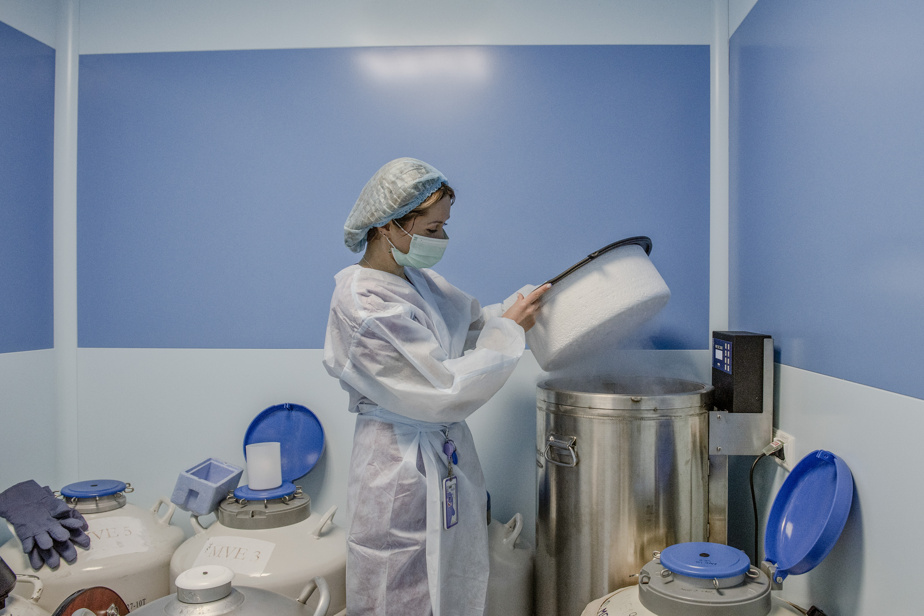A couple dreamed of a large family. He would have five children, who would have their father’s mop of curls, his smile and his dreamy eyes. He would teach them to paint and make pottery and take them for long walks in the forests near their hometown, Sloviansk, in eastern Ukraine.
Then Russia invaded their country, upsetting their plans. The husband, Vitaly Kyrkach-Antonenko, volunteered to fight and died on the battlefield, while his wife, Nataliya, was three months pregnant with their first child.
Today, still deeply bereaved, she says she will not give up on their dream. She intends to give siblings to her first child. Like hundreds of other Ukrainian soldiers, her husband froze his sperm before returning to fight, hoping that he could pass on his genes if he did not return home.
“Vitaly,” his wife said, “will be the father of all our future children. »
For many Ukrainians, the idea of saving soldiers’ sperm is both personal and patriotic. She helps men who want to make sure something will be left of them if they die, and she brings comfort to their partners. In a country now famous for its spirit of resistance, it is also an additional way to fight. It leaves open the possibility, at least, of preserving Ukrainian bloodlines, even if the Kremlin insists that the existence of the Ukrainian state – and by extension of Ukrainians as a distinct people – is a fiction.
“This is a continuation of our genetic heritage,” said Oksana Dmytriieva, the Ukrainian lawmaker behind the bill, which has already cleared a hurdle to pass it in a first vote.
Several clinics have already started offering this service free of charge. Nataliya Kyrkach-Antonenko has unexpectedly become a role model for the cause, using her Facebook page to encourage male soldiers and their wives to give themselves the opportunity to start a family no matter what happens on the battlefield.
“The modern world allows us to give birth to and nurture the children of our fallen loved ones, the bravest and most courageous human beings in this world,” she wrote. Raise them to the height of their father, with the same love for Ukraine, and give them the chance to live in the country for which their father shed his blood. »
These messages of resistance seem to have reached Russia as well.
A pro-Kremlin journalist, Olga Skabeeva, recently told Russian state television that freezing soldiers’ sperm amounted to “genetic experiments aimed at building a nation”.
Natalya Tolub, spokeswoman for IVMED fertility clinic in Ukraine’s capital Kyiv, said in an email that the journalist’s statements were a sign that Ukrainians had achieved their goal. “It’s a success,” she wrote.
Despite Ukrainian bravado in the face of adversity, experts say Ukraine cannot replenish its population, which was already in decline before the war, by using frozen sperm for pregnancies. But Jay Winter, a retired historian from Yale University, believes that is not the point.
By offering not only to die for Ukraine, but also to secure a new life, the soldiers were making a statement and showing their commitment to the survival of the country. “And the survival of the Ukrainian nation, he added, is what is at stake in this war. »
It’s hard to know the exact number of Ukrainian men who have had their sperm frozen, but Oleksandr Mykhailovych Yuzko, a physician and president of the Ukrainian Association of Reproductive Medicine, said requests have increased at clinics across Ukraine. .
He expects sperm to be used not only by some widows, but also by women whose husbands suffer injuries – physical or psychological – that render them impotent. He added that the government should do more to help women have soldiers’ children, by also funding assisted reproduction procedures.
“The first part is the preservation of reproductive cells,” he said. The second part is the restoration of the reproductive potential of Ukraine. »
The idea of freezing soldiers’ sperm is not new. During the wars in Iraq and Afghanistan, several cryogenic companies offered this service free of charge to American troops. In Israel, the families of fallen soldiers have gone further, fighting to advance a bill that would allow a family to use semen taken from the body of a dead soldier for reproductive purposes, to unless he has objected to it beforehand. Critics in Israel call this notion a “planned orphan.”
Petro Patij, a doctor at a fertility clinic in the western Ukrainian town of Lutsk, said many of his clients are still couples who come for family planning consultations or to resolve fertility issues. , but that he now felt compelled to also ask the men if they wanted to freeze their sperm.
And for some widows, it is not easy to give birth to the children of their missing partner.
Nadiia Lytovchenko is one of those struggling.
Last year’s invasion began on her fifth wedding anniversary to her husband, Andrii. By the end of the summer he was dead, killed in a Russian ambush, leaving his wife alone with their baby boy – and the sperm he had frozen years earlier for fear of escalating hostilities with Russia .
“It’s hard to make a decision and it’s too early to think about using your sperm,” said Ms. Lytovchenko, who has to deal with her grief, the financial difficulties caused by the death of her husband and the reality of raise their child alone.
“But it’s good to know that you have this possibility,” she added, before pausing. It’s just good to know. »

